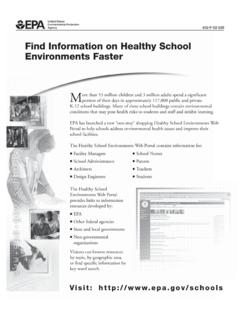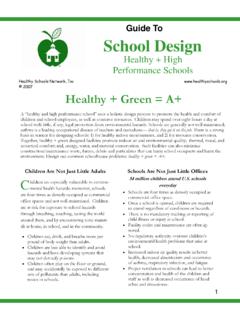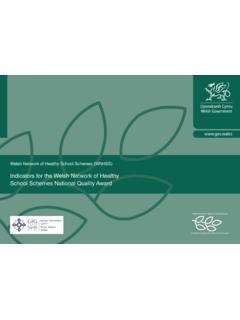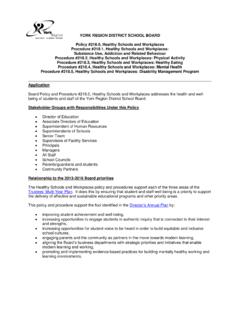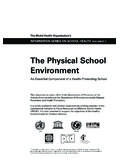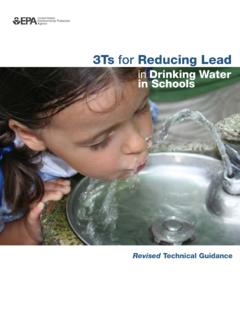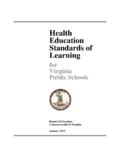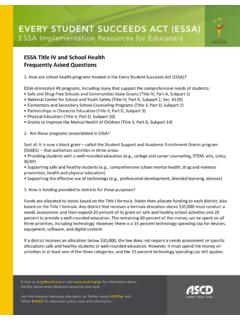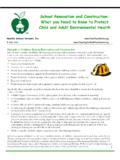Transcription of Skills for Health
1 The World Health Organization sINFORMATION SERIES ON school HEALTHDOCUMENT 9 Skills for HealthSkills-based Health education including life Skills : An important component of a Child-Friendly/ Health -Promoting SchoolWHO gratefully acknowledges the generous financial contributions to support the layout and printing of this document from: the Division ofAdolescent and school Health , National Center for Chronic DiseasePrevention and Health Promotion, Centers for Disease Control andPrevention, Atlanta, Georgia, principles and policies of each of the above agencies are governed by the relevant decisions of itsgoverning body and each agency implements the interventions described in this document in accordance with these principles and policies and within the scope of its BANKUNFPAWHOUNICEFiiiWHO INFORMATION SERIES ON school Health This document was prepared with the technical support of Carmen Aldinger and CherylVince Whitman, Health and Human Development Programmes (HHD) at EducationDevelopment Center, Inc.
2 (EDC). HHD/EDC is the WHO Collaborating Center to PromoteHealth through Schools and Gillespie of the Education Section at UNICEF and Jack T. Jones of the Departmentof Noncommunicable Disease Prevention and Health Promotion at WHO/HQ guided theoverall development and completion of this paper drew on a variety of sources in the research literature and on consultation withexperts from a previous paper, Life Skills Approach to Child and Adolescent HealthyDevelopment(Mangrulkar, L, Vince Whitman, C, and Posner, M, published by the PanAmerican Health Organisation, 2001); on a survey questionnaire administered to manyinternational agencies at the global, regional and national levels; and on material developed by UNICEF and WHO.
3 The draft for this paper was circulated widely to UNAIDS cosponsoring organisations and other partners identified below:CONTRIBUTORS:David Clarke, Department for International Development, London, UKDon Bundy and Seung Lee, World Bank, Washington, DC, USAC elia Maier, Partnership for Child Development, London, UKNeill McKee and Antje Becker, and colleagues, Johns Hopkins University, Baltimore, MD, USAI solde Birdthistle, Sara Gudyanga, Diane Widdus, Margareta Kimzeke, Peter Buckland, Elaine Furniss, Noala Skinner, Andres Guerrero,Aster Haregot, OnnoKoopmans, Elaine King, Nurper Ulkuer, Anna Obura, Changu Mannathoko, Paul Wafer,UNICEF/Headquarters, Regional and Country OfficesFrancisca Infante, PAHO, Washington, DC, USAC ecilia Moya and Kent Klindera, Advocates for Youth, Washington, DC, USABrad Strickland and Joan Woods, USAID.
4 Washington, DC, USAV. Chandra-Mouli, Child and Adolescent Health , WHO/HQ, Geneva, SwitzerlandCharles Gollmar, CDC, Atlanta, GA, USAD elia Barcelona, UNFPA/Headquarters, New York, NY, USAAnna-Maria Hoffmann, UNESCO, Paris, FranceivCONTENTSSKILLS FOR support for school was this document prepared? .. whom was this document prepared? .. are Skills -based Health education and life Skills ? .. is the focus of this document?..42. UNDERSTANDING Skills -BASED Health EDUCATION AND LIFE and learning methods for Skills -based Health education ..133. THEORIES AND PRINCIPLES SUPPORTING Skills -BASED Health and Adolescent Development Intelligences .. Learning Theory or Social Cognitive Theory .. Theory .. Influence Theory and Social Inoculation Problem Solving.
5 Theory .. of Reasoned Action and Health Belief Model .. of Change Theory or Transtheoretical Model ..244. EVALUATION EVIDENCE AND LESSONS research evidence concerning the effectiveness of Skills -based Health factors contribute to effective programmes? .. factors can create barriers to effective Skills -based Health education?..305. PRIORITY ACTIONS FOR QUALITY AND to scale .. Health education as part of comprehensive school Health .. Placement within the curriculum .. existing materials content to behavioural outcomes .. Development for Teachers and support teams ..456. PLANNING AND EVALUATING Skills -BASED Health analysis .. and ownership of all stakeholders .. goals and objectives.
6 For your Skills -based Health Process Evaluation .. Outcome Evaluation .. Assessing Skills -based Health education and life Skills in the 1: Documents in the WHO Information Series on school Health ..62 Appendix 2: Resources ..64 Appendix 3: Selected Skills -based Health education interventions .. INFORMATION SERIES ON school Health At the start of the 21st century, the learning potential of significant numbers of childrenand young people in every country in the world is compromised. Hunger, malnutrition,micronutrient deficiencies, parasite infections, drug and alcohol abuse, violence and injury,early and unintended pregnancy, and infection with HIV and other sexually transmittedinfections threaten the Health and lives of children and youth (UNESCO, 2001).
7 Yet theseconditions and behaviours can be improved. Skills -based Health education has been shownto make significant contributions to the healthy development of children and adolescentsand to have a positive impact on important Health risk appropriate developmental levels, from pre- school through early adulthood, young people can engage in learning experiences that help them prevent disease and injury andthat foster healthy relationships. They can acquire the knowledge and Skills they need, forexample, to practise basic hygiene and sanitation; negotiate and make healthy decisionsabout sexual and reproductive Health choices; or listen and communicate well in relationships. As they grow into young adults, they can play leadership roles in creatinghealthy environments advocating, for example, for a tobacco-free school or have an important role to play in equipping children with the knowledge, attitudes, and Skills they need to protect their Health .
8 Skills -based Health education is partof the FRESH framework (Focusing Resources on Effective school Health ), proposed andsupported by WHO, UNICEF, UNESCO, UNFPA, and the World Bank. This document waspublished jointly by agencies that support the FRESH initiative, and emphasises the roleof schools, however this document will also be relevant to out of school settings. Its purpose is to strengthen efforts to implement quality Skills -based Health education on anational scale PuskaDirector, Noncommunicable DiseasePrevention and Health PromotionWHO/HQ, Geneva, SWITZERLANDC ream WrightChief, Education SectionUNICEF, New York, USAC heryl Vince-WhitmanDirector, WHO Collaborating Center toPromote Health through Schools andCommunitiesEducation Development Center , Massachusets, USAMary Joy PigozziDirector, Division for the Promotion of Quality EducationUNESCO, Paris, FRANCEMari SimonenDirector, Technical Support DivisionUNFPA, New York, USARuth KagiaDirector, EducationHuman Development NetworkThe World Bank, Washington DC, USAFred Van LeeuwenGeneral SecretaryEI.
9 Education International,Brussels, BELGIUML eslie DrakeCoordinator, Partnership for ChildDevelopmentLondon, UNITED KINGDOM11. INTRODUCTIONSKILLS FOR HEALTHP urpose: to describe the rationale and audience for the document; define key concepts;and explain how Skills -based Health education, including life Skills , fits into the broadercontext of what schools can do to improve education and that children are healthy and able to learn is an essential part of an effective education system. As many studies show, education and Health are inseparable. A child snutritional status affects cognitive performance and test scores; illness from parasiticinfection results in absence from school , leading to school failure and dropping out (VinceWhitman et al.)
10 , 2001). Structures and conditions of the learning environment are asimportant to address as individual factors. Water and sanitation conditions at school canaffect girls attendance. Children cannot attend school and concentrate if they are emotionally upset or in fear of violence. On the other hand, children who complete moreyears of schooling tend to enjoy better Health and have access to more opportunities inlife. Equipping young people with knowledge, attitudes, and Skills through education isanalogous to providing a vaccination against Health threats. Educating for Health is animportant component of any education and public Health programme. It protects young people against threats both behavioural and environmental, and complements and supports policy, services, and environmental the decades, educating people about Health has been an important strategy for preventing illness and injury.










